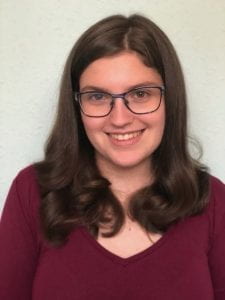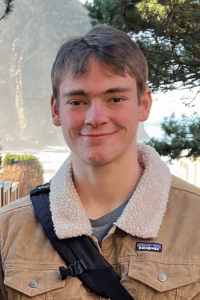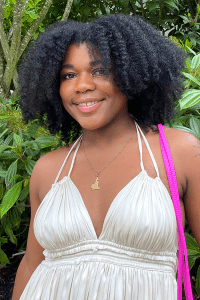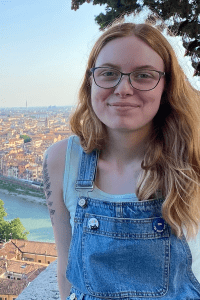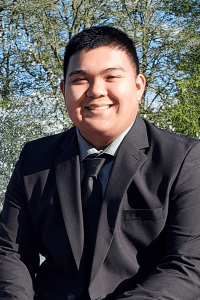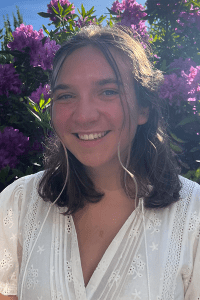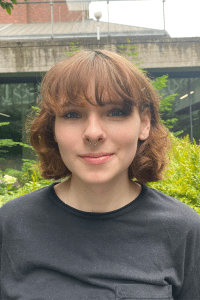
Nadia Barnard

Mayurika Bhaskar

Ethan Busi

Michaela Cheechov

Nick Frainey

Logan Russo
The Chemistry and Biochemistry department is pleased to introduce the recipients of our 2023 undergraduate scholarships! The department offers five annual scholarships for our undergraduate majors, with the application and selection process taking place each spring.
This years’ recipients are Nadia Barnard, Mayurika Bhaskar, Ethan Busi, Michaela Cheechov, Nick Frainey and Logan Russo.
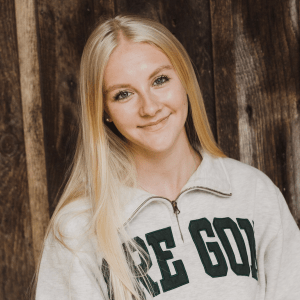 Nadia Barnard
Nadia Barnard
Anita and Friedhelm Baitis Scholarship
I’ve lived in Eugene for the past 8 years, but spent my early childhood in San Diego, California. I am going into my junior year as a Chemistry major in the Clark Honors College. I have always wanted to pursue a career in science because I love the way it challenges me and inspires me to contribute to improving the environment. As my studies advance, I continue to enjoy learning and researching chemistry at the University of Oregon.
My Research I joined the Boettcher Lab for Electrochemistry in the spring of my freshman year and have been working diligently ever since. My general focus is to use electricity to push chemical reactions forward and measure the interfacial kinetics by which this occurs. I entered the lab under the mentorship of Kira Thurman as a student in the general chemistry research immersion lab class, learning about electrochemical copper corrosion. Currently, I am mentored by graduate student Nick D’Antona, studying ion transfer over immiscible liquid-liquid and solid-liquid interfaces. I recently began independent research, focused on defining a model system of proton transfer between a thin-film tungsten oxide electrode and different proton donor sources. Tungsten oxide is being explored in certain energy storage and photovoltaic systems, so it is imperative to consider the characteristics of its ion transfer kinetics.
What’s next? In my final year of undergraduate, I hope to concurrently pursue a master’s degree and an additional internship in electrochemistry through the Oregon Center for Electrochemistry’s AMP (Accelerated Master’s Program). Following this, I plan to pursue a doctorate degree in chemistry and continue on to work in the renewable energy industry. Overall, I am determined to use my chemistry studies to contribute to developing technology that leaves a positive impact on the environment.
Undergraduate research has been my favorite part of going to the University of Oregon and it was a great honor to perform research this summer in the name of the Anita and Friedhelm Baitis foundation. I thank my scholarship donors immensely for gifting me the chance to perform research this summer. I would also like to extend my gratitude to Shannon Boettcher, lab members, professors, and the chemistry department staff for supporting my endeavors.
The Anita and Friedhelm Baitis Scholarship provides funding for two undergraduate students to conduct research during the summer in a chemistry or biochemistry laboratory at the University of Oregon, under the mentorship of a Chemistry and Biochemistry department faculty member.
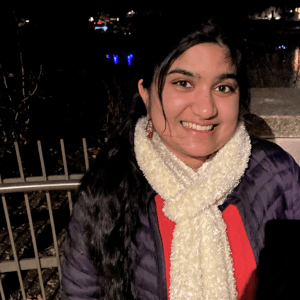 Mayurika Bhaskar
Mayurika Bhaskar
Percy Julian Scholarship
My name is Mayurika Bhaskar and I am a senior at the University of Oregon’s Clark Honors College double majoring in Biochemistry and Data Science with a domain emphasis in Biology. I was raised in Portland, Oregon, and have lived there for most of my life. One of my first fascinations in science was in epigenetics/genetics because it showed the power of how the smallest changes in one’s genetic code and/or environment can leave the biggest of impacts on their life. This pattern of seeing how the smaller molecular components worked together to accomplish important, complex biochemical processes fueled my curiosity for science and my ambitions to become a physician. My study of the sciences has given me a lens to better appreciate my body and the intricate processes it undergoes to keep me alive and healthy. Additionally, it informs my view of my other academic passions such as literary analysis and coding because I can study them from a “scientific” perspective and glean unique, meaningful insights.
My research I am currently at the Ambati Lab at the UO’s Knight Campus during the school year, and at the Grossberg Lab at OHSU’s Cell, Developmental, and Cancer Biology (CDCB) Department over the summer. I have been with the Ambati Lab for approximately 3 years and the Grossberg Lab for the past 2 summers. At the Ambati Lab, I have been studying the effects of common eye diseases like Fuchs Endothelial Corneal Dystrophy, or FECD, through mouse models by characterizing changes in the cornea. At the Grossberg Lab, I study the effects of IL6 on cancer cachexia (muscle wasting away that cannot be regained via nutritional supplementation) in pancreatic cancer mice and myotube models. Both forms of research are meant to further advance medical care in their respective fields by studying small but significant molecular changes.
What’s Next? After graduating, I plan on attending medical school and becoming a physician specializing in either oncology or endocrinology. During my immediate post-grad, I will work within the medical field, volunteer at local organizations, and organize with the global health grassroots organization Partners in Health (PIH) to implement and change healthcare policy both nationally and internationally. My goal is to be a physician who can apply modern advancements in clinical research to aid society’s most marginalized through high-quality medical care and to progress global health via advocacy work in healthcare policy.
I would like to thank the Department of Chemistry and Biochemistry for selecting me for this award. It is an honor and I plan to take the pioneering and courageous spirit of Percy Julian with me throughout my entire academic and professional career. I would also like to extend my immense gratitude to the professors, graduate students, and classmates I have had, and everyone at the Ambati and Grossberg labs for helping me cultivate my curiosity and passion for clinical research and medicine.
The Percy Julian Scholarship seeks to support talented undergraduate scientists in their pursuit of a career in chemistry and recognizes their contributions to promoting diversity, equity, and inclusion in STEM and their potential for further academic achievement.
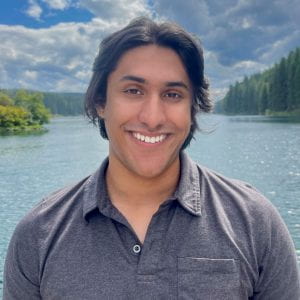 Ethan Busi
Ethan Busi
Faith Van Nice Scholarship
I am a junior from Portland, OR, studying biochemistry and human physiology and will graduate in 2025. Science has allowed me to explore the world at its most fundamental level, a series of chemical and biological building blocks. Studying biochemistry and human physiology has revealed a complex, fascinating, and mysterious side of the human body. I will strive to expand my knowledge of the biochemical aspects of the human body and apply the knowledge to promote health at UO.
My Research As a third year, I will join the Hansen Lab to investigate how our white blood cells make decisions in their environment by exploring cell singling mechanisms. What are the significant players that allow white blood cell migrations toward threats, and how do they regulate one another? A better understanding of our immune systems can lead to new therapeutics that utilize immune cells to combat infection, inflammation, and cancer.
What’s Next? I will continue to explore how the human body works from a biochemical lens while enhancing my knowledge within the human physiology classes at UO. I will develop a thesis for the Clark Honors College in the Hansen lab, where I will strive to develop critical thinking skills that allow me to succeed in medical school, where I am currently inspired to become a radiologist.
I want to thank the selection committee for choosing me for this award. Reading about Faith Van Nice and her outstanding accomplishments leaves me honored and motivates me to conduct research and attend medical school. I am also grateful to my professors and peers for supporting me, and I am excited to continue my education at UO.
The Faith Van Nice Scholarship is dedicated to the legacy of alumna Faith Van Nice, and recognizes exceptional UO undergraduate students majoring in Chemistry or Biochemistry.
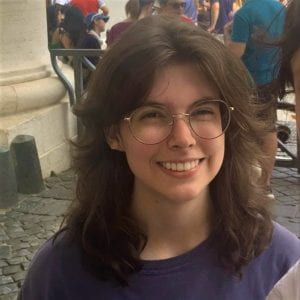 Michaela Cheechov
Michaela Cheechov
P-Chem Summer Research Fellowship
I’ve lived in Portland, Oregon my whole life, and I am going into my third year here at UO. Going into high school, I actually thought I didn’t like science, and wanted to be a social science teacher. However, after I took my first real physics class, I fell in love with STEM and decided to pursue it in college. I am now majoring in physics and planning a minor in bioengineering. Something that inspires me about science is just how many problems we have solved so far, and how many we have yet to even discover. The way that science is always changing and evolving is one of my favorite things about it, and I love being a part of this change through research.
My Research I currently work in the Guenza lab, a physical chemistry group. I started sitting in on group meetings during my first year here and became an active member of the group during my second. The focus of my work is using molecular dynamics computer simulations to simulate protein dynamics. We use a variety of methods including coarse graining, a method where we simplify the proteins to make the simulations significantly faster, and atomistic simulations where we simulate the protein in its entirety. During my time as a fellow, my focus will be on simulating and coarse graining alanine dipeptide.
What’s Next? After I finish my undergraduate degree, I hope to attend graduate school, either in medical physics or biophysics. I would love to pursue research as my career, but also would like to see my work directly benefit people in a clinical setting, so I hope to find a balance between these passions.
I am extremely grateful for the opportunity this award has provided me and would like to thank Dr. Guenza for introducing me to the world of research and helping me navigate it, as well as all the other members of the Guenza group for supporting me on this journey.
The P-Chem Undergraduate Fellowship provides funding for students to conduct research during the summer in a physical chemistry lab at the University of Oregon, under the mentorship of a physical chemistry faculty member.
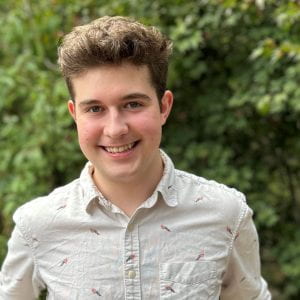 Nick Frainey
Nick Frainey
Baitis Summer Research Fellowship
I grew up in Beaverton, Oregon, my whole life and came to the UO in the fall of 2020. I’m now a senior majoring in chemistry. I’ve always been fascinated by knowing how and why the world around us behaves on a molecular and atomistic level, and chemistry really scratches that itch for me. I was inspired to pursue chemistry by my high school chemistry teacher, Ms. Farrell, who made learning chemistry an absolute treat.
My Research I have been doing research in the Wong Lab for close to a year now under the mentorship of Zach Walbrun. My research is focused on exploring the optical and electronic properties of materials with applications to organic photovoltaics. My project is primarily focused on copper phthalocyanine, a well-studied, solution-processable electron donor material. We study how materials behave as they are deposited into thin films through the use of in situ spectroscopy techniques, with the primary goal of exploring novel photophysical behavior as the molecules aggregate.
What’s Next? After graduation, I plan on pursuing a PhD in chemistry, likely with a focus on environmental chemistry or the study of renewable energy sources. I’ve always wanted whatever I end up doing to have a tangible impact on the world around me and I know that furthering my education in graduate school puts me on the right path to achieve that goal!
I am extremely grateful to Cathy Wong for not only nominating me for this fellowship, but also for giving me the opportunity to do research in the Wong Lab this past year. I would also like to thank Zach Walbrun for the mentorship and guidance he has provided, along with the rest of the Wong Lab and my professors for their teachings and support during my time at the UO.
The Anita and Friedhelm Baitis Scholarship provides funding for two undergraduate students to conduct research during the summer in a chemistry or biochemistry laboratory at the University of Oregon, under the mentorship of a Chemistry and Biochemistry department faculty member.
The Kuntz-Swinehart Memorial Scholarship recognizes academic excellence in our majors, and was established by former UO Chemistry students in honor of two professors whose instruction, influence and inspiration had a significant impact on their career paths.
 Logan Russo
Logan Russo
Kuntz-Swinehart Memorial Scholarship
I am a junior majoring in Chemistry from Salem, Oregon. My passion for science stemmed from my childhood dream of joining the medical field. Wanting to become a radiologist, imaging techniques and instruments sparked my interest in physical chemistry. I aspire to eventually study the intersection of the two fields, possibly through medical research.
My Research I joined the Wong Lab in the Fall of my freshman year, using ultrafast spectroscopy to investigate lead halide perovskite nanocrystals, a promising candidate for LEDs. Since then, I have become the head user of the Small Angle X-Ray Scattering instrument, and started creating a simulation which predicts ion migration in mixed-halide perovskites. The goal of my research is to better understand this potential material for new, efficient light emitting devices.
What’s next? After graduating from the UO, I will pursue a higher education. I will likely attend graduate school to receive a PhD, or potentially pursue my dreams of becoming an interventional radiologist through medical school. Either way, I plan to use my background in physical chemistry to improve the health of people from around the world.
I’m extremely honored to have been chosen for this award. I am thankful for all of those at the UO who have supported me in my academics and research these past two years, especially the members of the Wong Lab. I look forward to the rest of my time at the university and applying these skills after I graduate. Go Ducks!
 Loading...
Loading...

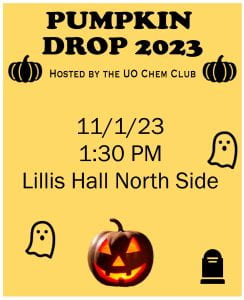






 Nadia Barnard
Nadia Barnard Mayurika Bhaskar
Mayurika Bhaskar Ethan Busi
Ethan Busi Michaela Cheechov
Michaela Cheechov Nick Frainey
Nick Frainey Logan Russo
Logan Russo